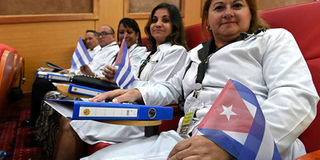Kenyan medics question Cuban colleagues' expertise

Cuban doctors follow proceedings during their induction at the Kenya School of Government in Nairobi on June 11, 2018. They were brought in to mentor Kenyan medics. PHOTO | SIMON MAINA | AFP
What you need to know:
- The Health ministry has previously accused medical superintendents of being a stumbling block to the Cuban deal.
- In 1975, its Health Commission made health a basic right and became a tenet on which Cubans judged the efficacy of their government.
Kenyan doctors are accusing their Cuban counterparts, who were brought into the country last year to boost healthcare services in the counties, of incompetence, giving spark to a row over their hiring that has been simmering for a year.
An August 7, 2019 memorandum by Health Principal Secretary Susan Mochache to medical superintendents — the heads of county health facilities — directing them to match up Cuban and Kenyan medics for “mentorship … to realise the full benefit of the Cuban doctors programme” seems to have given credence to the concerns earlier raised by local medical practitioners that the programme was ill-advised.
Sources say that there are increasing cases of incompetence being reported to the Kenya Medical Practitioners and Dentists Council.
For instance, a surgeon in Turkana has been deregistered by the board; while in Eldoret another Cuban medic was reported for referring "minor" cases such as urinary tract infections to his Kenyan counterparts.
“The ministry wants to cover up their incompetence; making sure that there is a Kenyan medic on hand to step in when there is a problem,” said a source familiar with discussions on a doctors' WhatsApp group.
EMBRACE DEAL
Asked if any cases of malpractice or incompetence had been reported, Kenya Medical and Practitioners and Dentists Board chief executive officer Daniel Yumbya directed the Sunday Nation to the principal secretary.
“I do not comment on the Cuban doctors’ issue, never have, and never will,” he said.
The Ministry of Health communications office told the Sunday Nation that the directive was supposed to work the other way round: the Cuban doctors are supposed to mentor their Kenyan counterparts.
"The Cubans have been here treating patients, but they have not been transferring the knowledge to the Kenyans; so we wrote that circular to ensure that happens,” said the ministry in a statement.
The Health ministry has previously accused medical superintendents of being a stumbling block to the Cuban deal; saying Kenyan doctors were not taking full advantage of the resource that is the foreign medics.
“We have to change with the times,” said the ministry.
BILATERAL DEAL
The Cuban medics have received mixed reviews. In some counties like Kisumu, Kisii, Nyamira and Kitui, the residents have praised their work while in a few others there have been accusations of incompetence.
To date, the government has not made public details of the deal. Last year, Health Cabinet Secretary Sicily Kariuki said it was a bilateral agreement "that cannot be wholly shared in the public domain".
As at 2015, the World Bank marked Cuba’s GDP per capita at about $7,000 (Sh700,000), five and a half times less than the United States of America, which placed trade embargoes on it and damned it into an economic limbo.
Cuba’s unique story in the annals of modern development is achieving 100 per cent literacy and free healthcare for all of its citizens.
In 1975, its Health Commission made health a basic right and became a tenet on which Cubans judged the efficacy of their government.
Monitoring what can be maximised for the country’s benefits, Cuba began training family doctors in large numbers, who are in the first layer of health provision.
FAMILY DOCTORS
In 2001, the World Health Organisation reported that there were 58 family doctors per 10,000 people, compared with 28 and 16 for United Kingdom and United States of America, respectively.
These doctors, like the ones in Kenya now, have become Cuba’s source of export earnings, especially to poorer countries and those in need of emergency medical care.
The family doctors caused the rearrangement of Cuba’s healthcare and are said to provide 97 per cent of outpatient care.
By 2008, there were 185,000 doctors in more than 103 countries in the world, including Africa.
As of 2009, according to data from the WHO, there were 1,034 Cuban doctors scattered in African countries.





